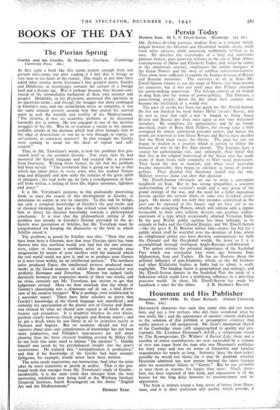Persia Today
Modern Iran. By L. P. Elwell-Sutton. (Routledge. I2S. 6d.)
MR. awELL-SurroN portrays modern Iran as a country which, lodged beween the Oriental and Occidental worlds, draws freely from other cultures, while remaining stubbornly faithful to its own. He sketches the vicissitudes of a long and sometimes glorious history, pays generous tributes to the era of Shah Abbas, contemporary of Akbar and Elizabeth Tudor, and, when he comes to the nineteenth century, emphasises the sordid intrigues of the Great Powers and the sway of ruthless concession-hunters. They alone were sufficient to explain the Iranian distrust of British and Russian intentions. The existence of oil in Iran—Mr. Elwell-Sutton refuses to use the name of Persia—has been known for centuries, but it was not until 19or that D'Arcy obtained his epoch-making concession. The foreign control of oil helped to drag Iran into the vortex of power-politics. The Iranians, a peace-loving people, dread the day when their country may become the battlefield of a world war.
The pace of events has been too quick for Mr. Elwell-Sutton. He has not finished his book before Hitler invades Russia, and he sees at once that such a war is bound to bring Great Britain and Russia into Iran once again as not very welcomed intruders. He completes his appreciative, and by no means uncritical, study of Reza Shah Pahlevi, the strong ruler a little corrupted by almost unfettered personal power, and before the proofs are returned to him Great Britain and Russia have decided that the Shah must vacate the throne. The pace has not yet begun to slacken in a country which is certain to follow the fortunes of war in the Far East closely. The Iranians have a respect for authoritarian rule, and, unhappily, their belief that they live in the original homestead of the Aryan race has made many of them listen with sympathy to Nazi racial pretensions. They faced the war as neutrals, and when strict neutrality became impossible, they began to calculate in terms of power- politics. They decided that Germany would win the war. Military reverses alone can alter that decision.
Mr. Elwell-Sutton obviously set out to write a convenient handbook on Iran. But he has strong sympathies, a sensitive understanding of the country's needs and a sure grasp of the grand strategy of the war, and the need for a fuller exposition presses against the narrow limits of soiree two hundred octavo pages. He knows only too well that mistakes committed in the past can be repeated in the future, and we have yet to see whether the occupying Powers, which will tolerate only a regime favourable to their own military designs, can produce soldier- statesmen of a type which occasionally adorned Victorian India. In the past British public opinion has been lethargic in its attitude to India and the Colonial Empire, and Mr. Elwell-Sutton —like the great E. G. Browne before him—makes his bid for a public which shall be watchful over the destinies of Iran, where an enlightened policy can have decisive consequences for both the Oriental and the Occidental worlds, the more so if it is accomplished through intelligent Anglo-Russian collaboration.
The author stresses the potential importance of the Saadabad Pact which was concluded four years ago between Iran, Afghanistan, Iraq and Turkey. He has no illusions about the political influence of pan-Islamism, which, as the Ali brothers and other Khilafatist leaders in India had to admit, is really negligible. The binding factor is geographical and strategic, and Mr. Elwell-Sutton detects in the Saadabad Pact the seeds of a federation which could have a stabilising influence in a debt-free post-war world. In short, Mr. Elwell-Sutton has made his
handbook a tract for' the times. J. R. GLORNEY BOLTON.






















 Previous page
Previous page